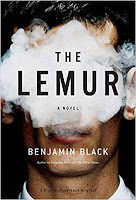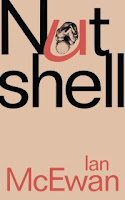At first promising but then soon developing into a lengthy uninteresting - straight guy falls unexpectedly in love with another straight guy, gets rejected, seeks revenge, looses all - type of tale. Boring. Predictable. Constructed. Lifeless.
“The Folded Leaf“ by William Maxwell:
I expected more, but still, it was a nice story about a friendship between two unlike, very different young men. A coming of age tale, written in 1945, a moving portrait of adolescence at these times. Maybe a bit outdated now but still there were some, if too few, touching passages of tenderness. Not a bad book.
“The Lemur“ by Benjamin Black:
A good short novel, I read it in half a day, by one of my favourite authors. My first book of John Banville writing as Benjamin Black. I have to say that I liked “Snow“ better but “The Lemur”still was an interesting story in good prose. Short and maybe sometimes too quick in its revelations and plot twists but that is not necessarily a bad thing. So, yes, I enjoyed it.
“The Insult” by Rupert Thomson:
Very soon into the story I discovered that I didn’t like it. While at first the plot seemed interesting - man gets shot, looses eyesight but miraculously still can see at night and thus fools all around him - it turned out a slightly boring, American-Existential-lone-wolf kind of story. I also didn’t like the writing, the prose. Not refined enough. 1/3rd through I had to lay it aside.
“At Night All Blood is Black” by David Diop:
Winner of the International Booker Prize 2021.
A very unusual first person tale of an African soldier fighting for France in the trenches of First World War, a dark novel which starts with gruesome depictions of avenging slaughter of enemy soldiers who have killed his best friend. After the killings memory sets in of childhood, first love and friendship, mixed with African lore, witchcraft and superstition, and leads to a strange reconciling transformation which might be madness. A simple yet precise, profound, very touching and sensual prose that mesmerises up until the end. Short but powerful, I really liked it.
“Winter” by Ali Smith:
As in “Autumn” this book sparkles with wit, insight, little stories galore. There is friendship, family, relationships, art, philosophy and above all, the absurdity of life and how, despite all its madness we still can go on cherishing it. I liked this one, too.
“On Chesil Beach“ by Ian McEwan:
What a surprise! What a wonderful, rich novel.
I have read quite a few of Ian McEwan’s books, prominent about them “The Atonement“. Then, in favour of other interesting writers I kind of lost contact, out of sight, out of mind.
And now this, to me, truly remarkable and unexpected gem of a book.
The story, a study in human behaviour, a portrait of two young lovers who get married at the end of the 1950s to then spend their honeymoon in a hotel at Chesil Beach, UK. And all goes spectacularly wrong. Although they truly love each other they know nothing about love and while he is driven by love and desire to consummate their marriage, she discovers that it is not for her, she finds everything about it utterly revolting.
I have rarely (or never) read such an insightful, tender yet accurate rendering of both her and his inner mind’s workings, their feelings, their psychological woes. And as if that would not be enough, the book also paints a picture of those then times and means of life. Very English, very touching. Beautiful prose. Another masterpiece, a tale of how a simple gesture, made or not made, can alter irreversibly two lives. Might be my best book of the year.
“Nutshell“ by Ian McEwan:
Since my (re)discovery of Ian McEwan and “On Chesil Beach” this is the second book by him I’ve read now. And again I marvelled at the complexity, the interesting “stage setting“ of an old tale (Hamlet), told and altered, in accordance to modern times. An unborn child tells the story of how his mother and her lover (the evil uncle) plan to murder his father. With intelligent, philosophical eye and mind and with a great knowledge of history and English poetry it paints a portrait of the world outside of its motherly cocoon. The book is many things, it is pastoral, it is comical, it is a crime story, it is even tragical. Sometimes voyeuristically erotic, then moralistic or politicised or just funny. The prose is best McEwan, the plot gripping. Another masterpiece, highly recommendable.
“Machines Like Me” by Ian McEwan:
And another masterpiece by McEwan. I am deeply impressed.
In a timeline, very near to ours but quite different in some aspects, not only does he tell, with usual intelligence and beautiful prose, a most interesting plot, but raises questions regarding moral, ethics, humanity, free will, society, the value of life and consciousness, be it natural or artificial.
He constructs a love triangle in very rare form, that between 2 humans and an AI and all the complications that are bound to arise there off.
And he pays homage to Alan Turing, mistreated great mathematician, kindly erecting a memorial, giving a grand scientific mind a second chance on life, fulfillment, appreciation and love that England, in reality, had denied him cruelly ungrateful.
The book to me was greatly rewarding, both in intellectual and emotional input. I loved reading it and think it a great achievement. Book 3 so far of rediscovered McEwan and no disappointment.
“Solar” by Ian McEwan:
Number 4 so far of my dive into recently (re)discovered Ian McEwan. After “On Chesil Beach”, “Nutshell” and “Machines Like Me”, whom I all very much liked, now “Solar”. I also liked Solar, but on another scale. The topic, mainly Environment and Clean Energy, the science, as always with McEwan unobstrusively educational incorporated into the text, is interesting but not as much to me, I shamefully admit, as drama in relationship or philosophical pondering the future of humanity or the evaluation of AI consciousness.
Furthermore the main character is this time, unlike the other characters in the former books, a very unlikable one: A fat, greedy, selfish Nobel Laureate physicist whose fifth marriage is crumbling and who tries to invigorate his career by stealing from an assistant’s work.
The plot is still gripping, the crime a clever one and all is still infused with the dry black humour McEwan is so very apt at. So, all in all still a recommendable witty read, I just happened to like the other novels more.
“Amsterdam” by Ian McEwan:
Right from the beginning a promising read. Where in “Solar” the playfield was the science of environmental care and clean energy, in “Machines Like Me” Artificial Intelligence, in “On Chesil Beach” the personal drama of love doomed to fail in the face of incongruous desires and irrevocable decisions, this time in “Amsterdam“ McEwan has chosen as playfield the world of music. A basic knowledge of specific terminology and history of art music is helpful in appreciating some of the text but not mandatory, for the novel shines with biographies and characters which are step-off-the-page convincing.
The livelong friendship of composer Clive Linley and editor Vernon Halliday is put to a hard test when, after attending the funeral of Molly, their former lover from a time when they all where young, their thoughts turn to morbidity, existence, life’s cruelties and death’s inevitability and they, not wanting an undeserved end like hers, agree on a mutual death pact.
Very good McEwan, in the league of Nutshell, Machines Like Me, Atonement or On Chesil Beach. Loved reading it!
#robertfaeth, #painterinBerlin, #painting, #art, #bookblog, #bookreviews, #literaturelover, #poem, #poetry

















